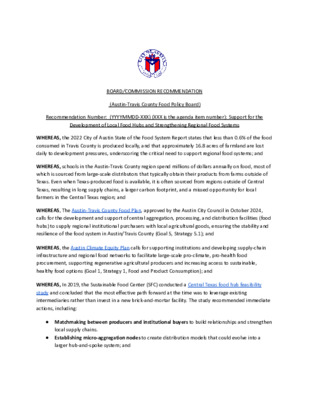Item 6. Food Hub Recommendation DRAFT — original pdf
Backup

BOARD/COMMISSION RECOMMENDATION (Austin-Travis County Food Policy Board) Recommendation Number: (YYYYMMDD-XXX) (XXX is the agenda item number): Support for the Development of Local Food Hubs and Strengthening Regional Food Systems WHEREAS, the 2022 City of Austin State of the Food System Report states that less than 0.6% of the food consumed in Travis County is produced locally, and that approximately 16.8 acres of farmland are lost daily to development pressures, underscoring the critical need to support regional food systems; and WHEREAS, schools in the Austin-Travis County region spend millions of dollars annually on food, most of which is sourced from large-scale distributors that typically obtain their products from farms outside of Texas. Even when Texas-produced food is available, it is often sourced from regions outside of Central Texas, resulting in long supply chains, a larger carbon footprint, and a missed opportunity for local farmers in the Central Texas region; and WHEREAS, The Austin-Travis County Food Plan, approved by the Austin City Council in October 2024, calls for the development and support of central aggregation, processing, and distribution facilities (food hubs) to supply regional institutional purchasers with local agricultural goods, ensuring the stability and resilience of the food system in Austin/Travis County (Goal 5, Strategy 5.1); and WHEREAS, the Austin Climate Equity Plan calls for supporting institutions and developing supply-chain infrastructure and regional food networks to facilitate large-scale pro-climate, pro-health food procurement, supporting regenerative agricultural producers and increasing access to sustainable, healthy food options (Goal 1, Strategy 1, Food and Product Consumption); and WHEREAS, In 2019, the Sustainable Food Center (SFC) conducted a Central Texas food hub feasibility study and concluded that the most effective path forward at the time was to leverage existing intermediaries rather than invest in a new brick-and-mortar facility. The study recommended immediate actions, including: ● Matchmaking between producers and institutional buyers to build relationships and strengthen ● Establishing micro-aggregation nodes to create distribution models that could evolve into a local supply chains. larger hub-and-spoke system; and WHEREAS, Since 2019, SFC has facilitated supplier-buyer matchmaking, and a food hub pilot program has been launched in partnership between the Central Texas Food Bank and Central Texas school districts including Lake Travis ISD, Manor ISD, and Florence ISD. However, significant barriers persist in scaling institutional procurement of local food; and WHEREAS, The landscape of local food procurement has changed significantly since 2019. Key developments include: ● Loss of Key Supply Infrastructure: The largest local farm in the region capable of meeting institutional demand has shut down, significantly reducing available supply. ● Underutilization of Local Food for Schools (LFS) grant funds: Texas schools have access to over $11 million through the Local Food for Schools (LFS) grant program, a federal initiative designed to support the purchase of locally produced foods for school meal programs. However, more than 50% of these funds remain unspent, and while schools express strong interest in sourcing hyper-local products from Central Texas producers, they face significant barriers in accessing them. This underutilization represents a major missed economic opportunity for Austin, TX farmers and food businesses and highlights persistent barriers to institutional procurement, including supply chain gaps and distribution challenges, that require further exploration. ● Shift in Regional Coordination Roles: SFC has transitioned away from its farm-to-institution coordination work, leaving a gap in value chain facilitation and market matchmaking. WHEREAS, The City is positioned to play a supportive role in coordinating regional food system efforts, ensuring broad stakeholder engagement, aligning food hub development with community needs and goals, and addressing emerging challenges in the food system; and NOW, THEREFORE, BE IT RESOLVED that the Austin-Travis County Food Policy Board urges the Austin City Council to allocate funds for a market and infrastructure assessment of the region’s farm-to-institution food system. This assessment should use community-driven research to identify current gaps, investment opportunities, and solutions for improving local food procurement in institutional markets, strengthening food hub infrastructure, and expanding the regional farm-to-school network; and BE IT FURTHER RESOLVED that the Austin-Travis County Food Policy Board encourages the Austin City Council to allocate funding to establish and facilitate regular stakeholder convenings, with the City serving as a neutral convener. These convenings should bring together local farmers, food service institutions, food hubs, non-profits, community organizations, and other stakeholders to develop a robust farm-to-institution network in Austin, Texas and align local food infrastructure development with broader regional goals and community needs. Date of Approval: _____________________________ Record of the vote: (Unanimous on a 7-0 vote, 4-3 vote with names of those voting no listed) Attest: _____________________________________________ (Staff or board member can sign)